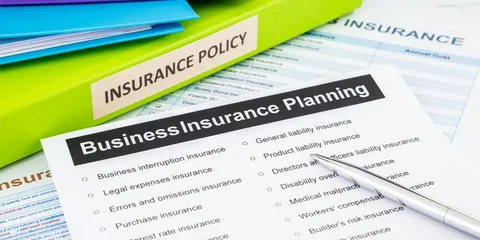Business insurance is a crucial aspect of risk management for companies of all sizes and across all industries. It provides a safety net against potential financial losses arising from various unforeseen events, such as natural disasters, accidents, lawsuits, or cyber-attacks. Without adequate insurance coverage, a single incident could potentially cripple a business, leading to significant financial strain or even bankruptcy.
Regardless of the nature of your business, whether it’s a small startup, a well-established corporation, or a service-based enterprise, the importance of having appropriate insurance coverage cannot be overstated. It not only safeguards your assets and investments but also protects your employees, customers, and the general public from potential liabilities.
Insurance acts as a risk transfer mechanism, allowing businesses to transfer a portion of their risks to an insurance company in exchange for a premium. This transfer of risk enables businesses to operate with greater confidence, knowing that they have a financial safety net in place to mitigate potential losses and ensure business continuity in the face of unexpected events.
Moreover, many businesses are legally required to carry certain types of insurance, such as workers’ compensation insurance or professional liability insurance, depending on their industry and location. Failure to comply with these legal requirements can result in hefty fines, penalties, or even the suspension of business operations.
In essence, business insurance is an essential component of a comprehensive risk management strategy, providing peace of mind and financial security for businesses of all sizes and types. By investing in appropriate insurance coverage, entrepreneurs and business owners can focus on growing their ventures without the constant worry of potential financial catastrophes lurking around the corner.
Contents
Protecting Your Assets
Business insurance plays a crucial role in safeguarding your company’s physical assets, including property, equipment, and inventory, from potential risks and liabilities. Unforeseen events like fires, natural disasters, theft, or accidents can result in significant financial losses, jeopardizing the continuity of your operations. By securing appropriate insurance coverage, you can mitigate these risks and protect your valuable assets.
Property insurance is designed to cover the cost of repairing or replacing your business premises, buildings, and their contents in the event of damage caused by covered perils such as fires, storms, or vandalism. This coverage ensures that you can quickly recover and resume operations without bearing the full financial burden of rebuilding or replacing your physical assets.
Additionally, business insurance can protect your equipment and machinery, which are essential for your daily operations. Equipment breakdown coverage can provide financial assistance for repairing or replacing damaged equipment, minimizing disruptions to your workflow and productivity.
By protecting your physical assets with appropriate insurance coverage, you can achieve peace of mind knowing that your business is prepared to withstand unexpected events and recover from potential losses. This safeguard not only preserves your financial stability but also ensures the continuity of your operations, allowing you to focus on growing and expanding your business without the constant worry of asset-related risks.
Mitigating Financial Risks
Business insurance plays a crucial role in mitigating financial risks that can potentially cripple your operations. Without proper coverage, a single lawsuit, accident, or natural disaster could result in devastating financial losses that might force you to close your doors permanently.
Lawsuits and legal liabilities can arise from various sources, such as employee disputes, customer injuries, or product defects. General liability insurance protects your business from the costs associated with these legal claims, including legal fees, settlements, and court-awarded damages. This coverage can prevent your business from bearing the full financial burden of a costly lawsuit.
Accidents and incidents can also pose significant financial risks. For example, if a customer slips and falls on your premises, you could be held liable for their medical expenses and potential legal action. Property insurance covers the cost of repairing or replacing your business property in the event of fire, theft, or other covered perils, ensuring that you can quickly recover and resume operations.
Natural disasters, such as hurricanes, earthquakes, or floods, can cause extensive damage to your physical assets and disrupt your business operations. Commercial property insurance and business interruption insurance can provide financial protection against these catastrophic events, covering the cost of repairing or rebuilding your facilities and compensating for lost income during the recovery period.
By transferring these financial risks to an insurance provider, you can safeguard your business from the potentially devastating consequences of unforeseen events. With the right insurance coverage in place, you can focus on growing your business with the confidence that your financial well-being is protected against a wide range of risks.
Compliance with Legal Requirements
Operating a business comes with various legal obligations, and failing to comply with these requirements can result in severe penalties, fines, or even business closure. One crucial aspect of legal compliance is securing the appropriate insurance coverage mandated by federal, state, or local laws.
For instance, most states require businesses with employees to carry workers’ compensation insurance. This type of insurance provides medical benefits and wage replacement for employees who sustain job-related injuries or illnesses. Failure to maintain workers’ compensation coverage can lead to hefty fines and potential lawsuits from injured employees.
Similarly, businesses that operate vehicles for commercial purposes, such as delivery services or transportation companies, are typically required to have commercial auto insurance. This insurance protects the business from financial losses resulting from accidents involving company-owned vehicles, ensuring compliance with state laws and safeguarding against potential legal liabilities.
Certain industries or professions may also have specific insurance requirements. For example, healthcare providers must carry professional liability insurance, also known as malpractice insurance, to protect against claims of negligence or errors in their professional services.
By obtaining the legally mandated insurance coverage, businesses not only avoid costly penalties and legal issues but also demonstrate their commitment to operating within the bounds of the law. Compliance with legal requirements is essential for maintaining a reputable business and mitigating potential risks associated with non-compliance.
Enhancing Business Credibility
Having proper business insurance is crucial for enhancing a company’s credibility and reputation in the eyes of potential clients, partners, and investors. It demonstrates a level of professionalism and responsibility that sets a business apart from its competitors. Clients and partners are more likely to trust and feel secure working with a company that has taken the necessary steps to protect itself and its stakeholders.
Moreover, many clients and partners, particularly larger organizations or government entities, may require proof of adequate insurance coverage before entering into a contract or agreement. By having the appropriate insurance policies in place, a business can meet these requirements and open doors to valuable opportunities and collaborations.
Investors also view business insurance as a sign of responsible risk management. Companies that prioritize protecting their assets and mitigating potential liabilities are seen as more financially stable and less risky investments. This can increase a business’s chances of securing funding or attracting investors, which is essential for growth and expansion.
Furthermore, having comprehensive business insurance coverage can help a company recover more quickly from unexpected events or accidents, minimizing disruptions to operations and preserving its reputation. A business that can bounce back swiftly and continue delivering quality products or services to its clients is more likely to maintain a positive image and customer loyalty.
In today’s competitive business landscape, credibility and reputation are invaluable assets. By investing in proper business insurance, companies can demonstrate their commitment to professionalism, risk management, and stakeholder protection, ultimately enhancing their credibility and attractiveness to potential clients, partners, and investors.
Types of Business Insurance
No matter the size or industry of your business, having the right insurance coverage is crucial for protecting your assets and mitigating potential risks. Here are some of the most common types of business insurance:
General Liability Insurance
General liability insurance provides coverage for third-party claims of bodily injury, property damage, and personal injury (such as libel or slander). This type of insurance is essential for businesses that interact with customers, clients, or the public, as it can protect against lawsuits and financial losses resulting from accidents or incidents on your premises or during operations.
Professional Liability Insurance (Errors and Omissions)
Professional liability insurance, also known as errors and omissions (E&O) insurance, is designed to protect businesses that provide professional services or advice. It covers claims of negligence, errors, or omissions that result in financial losses for clients. This type of insurance is particularly important for businesses such as consultants, accountants, lawyers, and healthcare professionals.
Property Insurance
Property insurance provides coverage for physical assets, such as buildings, equipment, inventory, and office furniture. It can protect your business from losses due to events like fires, theft, vandalism, or natural disasters. Depending on your coverage, property insurance may also include business interruption insurance, which can help cover lost income and additional expenses if your business operations are disrupted due to a covered event.
Business Interruption Insurance
Business interruption insurance is designed to compensate for lost income and additional expenses incurred when a covered event, such as a fire, natural disaster, or other insured peril, forces your business to temporarily cease operations or relocate. This type of insurance can help cover expenses like employee salaries, rent, and other fixed costs during the period of interruption, allowing your business to recover and resume operations more smoothly.
Workers’ Compensation Insurance
Workers’ compensation insurance is a legal requirement in most states for businesses with employees. It provides coverage for medical expenses, lost wages, and other benefits for employees who sustain work-related injuries or illnesses. This type of insurance can protect your business from lawsuits and financial losses related to workplace accidents or occupational hazards.
These are just a few examples of the different types of business insurance available. Depending on your specific business operations, industry, and risks, you may need additional or specialized coverage. It’s essential to assess your business’s unique needs and consult with an insurance professional to ensure you have the appropriate protection in place.
Assessing Your Business Risks
Conducting a thorough risk assessment is crucial to identify potential risks and liabilities specific to your business. This process will help you determine the appropriate insurance coverage needed to protect your assets and operations. Every business faces unique risks, and it’s essential to understand and evaluate these risks to make informed decisions about insurance.
Begin by analyzing your business operations, including the products or services you offer, your physical location, the number of employees, and any specialized equipment or machinery you use. Consider the potential risks associated with each aspect of your business, such as property damage, liability claims, cyber threats, or employee injuries.
Next, examine your industry and the regulatory environment in which you operate. Certain industries may be subject to specific regulations or legal requirements that necessitate particular types of insurance coverage. For example, businesses in the construction or healthcare sectors may need specialized insurance policies to comply with industry standards and regulations.
Additionally, consider the potential financial impact of various risks on your business. Evaluate the costs associated with potential lawsuits, property damage, or business interruptions. This analysis will help you determine the appropriate coverage limits and deductibles that align with your risk tolerance and financial capabilities.
The Cost of Business Insurance
The cost of business insurance can vary significantly depending on several factors. One of the primary determinants is the type of business you operate. Businesses that involve higher risks, such as construction or manufacturing, will typically face higher insurance premiums compared to lower-risk businesses like consulting or retail.
Another crucial factor is your business location. Areas with higher crime rates, natural disaster risks, or a higher density of businesses may result in higher insurance costs. Additionally, the number of employees you have can impact your insurance premiums, as more employees generally translate to a higher risk of claims.
Your claims history also plays a significant role in determining your insurance costs. Businesses with a history of frequent or costly claims will likely face higher premiums, as insurers perceive them as higher-risk clients. Conversely, businesses with a clean claims record may be eligible for lower premiums or discounts.
Other factors that can influence insurance costs include the coverage limits you choose, the deductibles you opt for, and any additional endorsements or riders you add to your policy. It’s essential to work closely with an insurance agent or broker to understand the specific factors that impact your business’s insurance costs and find the right balance between coverage and affordability.
Choosing the Right Insurance Provider
Selecting the right insurance provider is crucial for ensuring your business is adequately protected. Here are some tips and considerations to keep in mind:
-
Reputation and Financial Stability: Research the insurance company’s reputation, financial strength, and claims-paying ability. Look for companies with high ratings from independent agencies like A.M. Best, Moody’s, or Standard & Poor’s. A financially stable insurer is more likely to be able to pay claims when needed.
-
Coverage Options: Evaluate the range of coverage options offered by the insurance provider. Ensure they provide the specific types of insurance your business requires, such as general liability, property, professional liability, and cyber insurance. Look for providers that offer customizable policies tailored to your industry and business needs.
-
Customer Service and Claims Handling: Consider the insurance provider’s customer service reputation and claims handling process. Look for companies that are responsive, transparent, and efficient in handling claims. Read reviews and ask for references from current or past clients to gauge their experiences.
- Risk Management Services: Look for insurance providers that offer risk management services, such as safety training, loss prevention programs, and risk assessments. These services can help you mitigate risks and potentially lower your insurance costs over time.
Remember, choosing the right insurance provider is an important decision that can impact the long-term success and protection of your business. Take the time to research and evaluate your options carefully to find the best fit for your specific needs.
Reviewing and Updating Your Coverage
As your business grows and evolves, it’s crucial to regularly review and update your insurance coverage to ensure it remains adequate and relevant. Your insurance needs may change due to various factors, such as:
-
Business Expansion: If you’ve expanded your operations, acquired new assets, or entered new markets, your existing coverage may no longer be sufficient.
-
Changes in Regulations: Legal and regulatory requirements can change over time, necessitating adjustments to your insurance policies to maintain compliance.
-
New Products or Services: Introducing new products or services can expose your business to different risks, requiring additional or modified insurance coverage.
-
Changes in Risk Exposure: Your business’s risk exposure can change due to factors like new technologies, industry trends, or shifts in your customer base, requiring insurance updates.
Regularly reviewing your insurance coverage with your insurance provider or a professional advisor can help identify gaps or areas where your coverage may be inadequate. This proactive approach ensures that your business remains properly protected against potential risks and liabilities, providing peace of mind and financial security as your business continues to grow and evolve.











